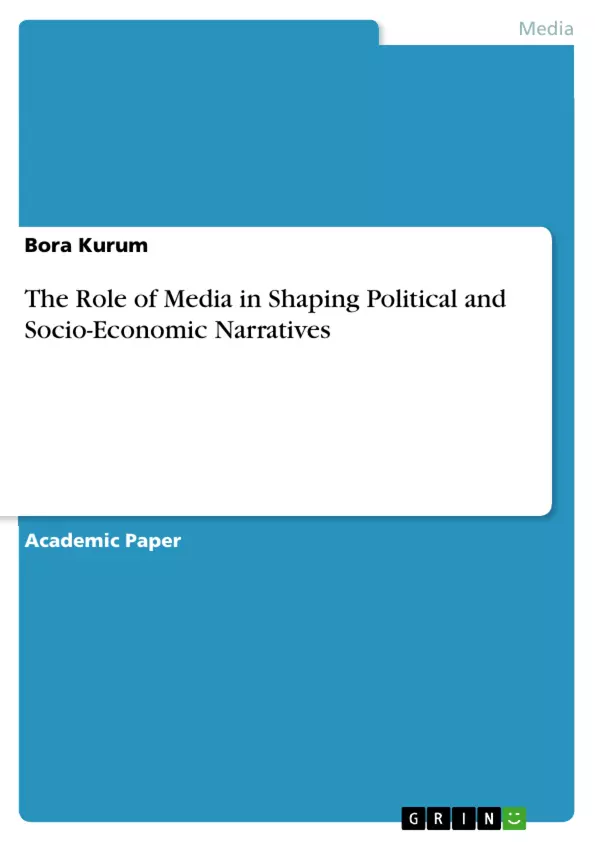The media plays an integral role in influencing trends in the modern world. The information era, a phrase used to capture the way the world has developed to rely on information for most of the actions that people take, remains significantly different from all the other periods in the history of humanity. Information and narratives now have significant powers to change and influence the way people think and act, and more importantly, the reasoning they portray on various topics in their societies. The media plays a significant role in pushing for specific narratives and messages in the modern world. The current media has emerged as the most advanced system of communication that the humanity has ever experienced. Unlike in the past when information and narratives could take long periods to reach people, today the situation is significantly different owing to the developments that the modern media has seen in recent years. The role of the contemporary media in driving narratives has been studied quite extensively. The existing base of literature has focused mainly on the way the media delivers messages from the source to the consumer.
The current paper recognises that most researchers and commentators have not studied as extensively as required the role that media and communication play in driving narratives on political and social-economic trends. As such, the focus of this paper will be on the ways through which media and communication outlets influence the reasoning that people hold as truths in a world that has diverse sources of unfiltered information from multiple sources.
Inhaltsverzeichnis (Table of Contents)
- Introduction
- Theoretical Background
- The Narratives of a Modern World
- The Evolving Strategies and Roles of the Media
- The Perception of Bias from the Media
- The Types and Impact of Media Bias on Political and Socio-economic Trends
- Measuring and Evaluating Media Bias and the Factuality of Narratives
- The Emerging Threat of 'Fake' News
- The Possibility of Attaining Balanced and Objective Media Reporting and Coverage
- What ought to be Done Going Forward
- Further Recommendations for the Future
- Conclusion
Zielsetzung und Themenschwerpunkte (Objectives and Key Themes)
This paper examines the role of media in shaping political and socio-economic narratives, highlighting how media outlets influence public perception and reasoning. It explores the strategies used by media to promote specific narratives, analyzes the impact of media bias on political and socio-economic trends, and investigates the emerging threat of 'fake' news.
- The power of narratives in shaping public opinion and behavior
- The strategies employed by media to influence narratives and promote specific agendas
- The impact of media bias on political and socio-economic trends
- The emerging threat of 'fake' news and its implications for democratic societies
- The need for balanced and objective media reporting and coverage
Zusammenfassung der Kapitel (Chapter Summaries)
- Introduction: The paper begins by highlighting the significant role media plays in shaping narratives in the information era. It contrasts the contemporary media with historical communication systems, emphasizing the speed and reach of modern media platforms. The paper highlights the existing literature on media's influence on narratives, highlighting the focus on delivery of messages and the lack of attention to the role of media in driving narratives on political and socio-economic trends.
- Theoretical Background: This section defines narrative as a record of interconnected events, emphasizing its role in shaping individual beliefs. It discusses the impact of media on public perception, particularly in relation to contentious issues and diverse viewpoints. The chapter argues that media plays a critical role in shaping public beliefs and influencing political and socio-economic agendas.
- The Narratives of a Modern World: This chapter explores the rapid spread of narratives in the modern world, facilitated by advanced media systems. It emphasizes the strategic role of media in choosing, packaging, and presenting information to evoke specific reactions. The chapter highlights the importance of recognizing multiple perspectives within narratives and the potential for media outlets to promote specific agendas through their selection and presentation of information.
Schlüsselwörter (Keywords)
The paper focuses on key concepts such as media narratives, political and socio-economic trends, media bias, 'fake' news, information dissemination, and public perception. It explores the relationship between media influence, public reasoning, and the formation of beliefs in a complex and interconnected information environment.
- Quote paper
- Bora Kurum (Author), 2018, The Role of Media in Shaping Political and Socio-Economic Narratives, Munich, GRIN Verlag, https://www.grin.com/document/430204



